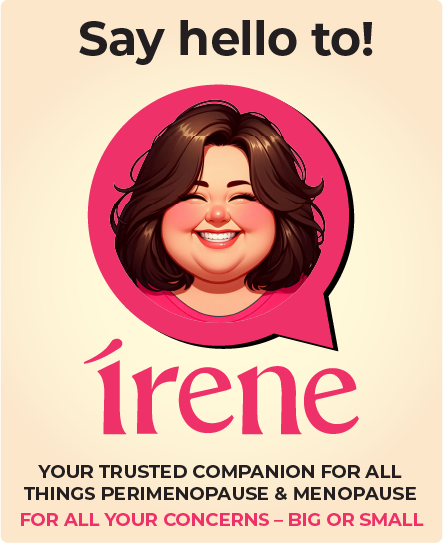How to Delay Menopause and Maintain Hormonal Balance
How to Delay Menopause and Maintain Hormonal Balance
Hey! Let’s Talk About Delaying Menopause
Hey! Let’s Talk About Delaying Menopause
Menopause, the natural end of a woman’s reproductive years, can bring a wave of emotions – excitement for a new chapter, but also anxieties about hot flashes, sleep issues, and the whole idea of our bodies changing.
Understanding Menopause
The average age for menopause is around 51, but some women experience it earlier, which is known as early menopause (before 45) or premature menopause (before 40). There are ways to delay menopause and create a smoother transition potentially.
At Miror, we get it. We’re here to support you through every stage of your journey, including exploring ways to delay menopause naturally.
While there’s no magic bullet, research suggests certain lifestyle tweaks and practices can potentially push back menopause’s arrival. So, grab a cup of tea, settle in, and explore ways to delay menopause naturally and embrace a smooth transition.
Why Delay Menopause?
Think of delaying menopause as giving yourself more time. More time to enjoy youthful energy, hormonal balance, and a stronger body. Here are some reasons why you might consider delaying menopause:

- Health Benefits: Delaying menopause can reduce the risk of health issues linked to estrogen deficiency, like osteoporosis and heart disease.
- Symptom Management: Hot flashes, night sweats, mood swings – not exactly a picnic! Delaying menopause might mean holding off on these uncomfortable symptoms for a while longer.
- Fertility Preservation: If you’re considering having children later in life, delaying menopause could extend your window for childbearing.
- A Feeling of Control: It’s about taking charge of your well-being. By working towards a natural delay, you’re taking an active role in your health.
Factors Affecting Menopause Timing
While the average age falls between 45 and 55, the exact timing can vary greatly. This variation is influenced by a complex interplay of factors, some preordained by our genes and others shaped by our lifestyle choices. Let’s delve deeper into these key influences:

- The Genetic Blueprint: Absolutely not! While some physical changes might occur, it doesn’t mean the end of a satisfying sex life. Open communication with your partner and a willingness to explore new things can keep the flames burning bright.
- A Head Start on Periods: The age at which you get your first period (menarche) can be a predictor for menopause. Women who start their periods earlier tend to experience menopause as well. This suggests a pre-programmed timeline for ovarian function.
- The Reproductive History: A large study involving over 100,000 women offers encouraging news for breastfeeding mothers. The research suggests a link between pregnancy and breastfeeding history, and the timing of menopause. Each full-term pregnancy itself appears to offer a protective effect, reducing the risk of early menopause (before age 45). The benefit increases with the number of pregnancies, with one pregnancy lowering the risk by 8%, two by 16%, and three by 22%. Breastfeeding duration adds another layer of influence. Women who breastfed for a combined total of 25 months saw a 27% decrease in risk compared to those who breastfed for less than a month.
- Smoking: Smoking is a well-known culprit for a variety of health problems, and menopause is no exception. The chemicals in cigarettes can damage egg cells and accelerate ovarian decline, leading to earlier menopause.

- When Your Body Attacks Itself: Autoimmune diseases like lupus can mistakenly target healthy tissues, including the ovaries. This damage can disrupt ovarian function and potentially trigger premature menopause.
- Race and Ethnicity: Research suggests a racial/ethnic variation in menopause timing. On average, Caucasian women tend to experience menopause later compared to African American, Hispanic, and Asian women. The reasons behind this are still being explored.
- Socioeconomic Factors: Studies suggest a link between education level, socioeconomic status, and menopause timing. Women with higher education and socioeconomic status might experience menopause later. This could be due to factors like better access to healthcare, healthier lifestyles, or lower stress levels.
- Body Weight and Hormonal Health: Body weight can influence hormone production and metabolism. Women with higher body mass index (obese) might go through menopause later than leaner women. However, the exact mechanisms behind this are still being investigated.
It’s a Combination, Not a Solo Act. These factors often work together. For instance, a woman with a genetic predisposition for early menopause who also smokes might experience it even earlier.
While you can’t control your genes, you can influence some other factors. Maintaining a healthy weight, exercising regularly, quitting smoking, and managing stress can all contribute to overall well-being and potentially influence menopause timing to some degree.
If you have concerns about your menopause timing, talk to a doctor. They can assess your risk factors, discuss your family history, and address any questions you may have. Menopause is a natural part of life, and with knowledge and preparation, you can confidently navigate this transition.
How to Delay Menopause
Now, let’s get to the good stuff! Here are some strategies to delay menopause naturally:
- Foods to the Rescue: What you eat plays a big role in hormonal health. Consider incorporating foods rich in phytoestrogens and antioxidants. Phytoestrogens are plant-based compounds that mimic estrogen in the body. Some excellent sources include soy products like tofu, tempeh, edamame, sesame seeds, lentils, and beans. For antioxidants, load up on colourful vegetables like bell peppers, beets, and carrots. Cruciferous veggies like broccoli and cauliflower are also great choices. Delaying menopause naturally starts with nourishing your body from the inside out!
- Move Your Body: Regular physical activity is a magic bullet for overall health, and it can also be beneficial for delaying menopause. Aim for at least 30-40 minutes of exercise most days of the week. Activities like squats, jogging, and yoga can support hormonal health and potentially delay menopause.

- Prioritize Sleep: When you’re sleep-deprived, your body struggles to regulate hormones, leading to mood swings, irritability, and difficulty concentrating. Aim for 7-8 hours of quality sleep each night. Develop a relaxing bedtime routine that includes taking a warm bath, reading a book, or practicing gentle stretches. Create a sleep-conducive environment by keeping your bedroom cool, dark, and quiet.
- Harness the Power of Plants: While research is ongoing, some natural supplements like black cohosh or red clover may help manage menopausal symptoms. Talk to your doctor before starting any supplements to ensure they’re safe for you.
- Yoga to Delay Menopause: Yoga isn’t just about fancy poses (although those can be fun too!). Yoga and Pilates can improve flexibility, balance, and stress management, all of which can contribute to a smoother menopausal transition and potentially delay menopause with yoga.
Here are some specific yoga asanas that might be helpful:- Bhujangasana (Cobra Pose)
- Balasana (Child’s Pose)
- Ustrasana (Camel Pose)
- Tadasana (Mountain Pose)
- Savasana (Corpse Pose)
- Salamba Sarvangasana (Shoulder Stand Pose)
- Marichyasana A (Marichi’s Pose)
- Janu Sirsasana (Head-to-Knee Forward Bend)
How to Delay Menopause Naturally with Ayurveda?
Ayurveda, the ancient Indian system of medicine, offers a holistic approach to wellness during menopause. Here are some Ayurvedic practices to explore:

- Dinacharya, Ritucharya, and Ratricharya: These practices emphasise daily routines, seasonal adjustments, and nightly rituals to promote overall well-being and hormonal balance.
- Dietary Adjustments: Ayurveda focuses on a balanced diet based on your unique dosha (body type). Pitta-pacifying foods like bitter vegetables, sweet fruits, and certain spices might be recommended to manage hot flashes, common during perimenopause.
- Herbal Remedies: Certain Ayurvedic herbs like Shatavari, Ashwagandha, and Fenugreek may help balance hormones and alleviate menopausal symptoms. It’s crucial to consult an Ayurvedic practitioner for personalized guidance on herbal remedies.
- Panchakarma Cleanse: This traditional detoxification process can help eliminate toxins and improve overall health, potentially impacting menopause timing.
Your Takeaway!
There are ways to potentially delay menopause and ease the transition. This can be done through lifestyle changes such as maintaining a healthy weight, eating a nutritious diet rich in phytoestrogens and antioxidants, exercising regularly, getting enough sleep, and managing stress. You can also explore natural supplements and yoga practices designed to support hormonal health. Ayurveda, an ancient Indian system of medicine, offers a holistic approach to delaying menopause with practices like Dinacharya, Ritucharya, and Ratricharya, dietary adjustments, herbal remedies, and Panchakarma cleanses. If you have concerns about your menopause timing, talk to a doctor to get personalised advice.

Conclusion
Menopause is a natural shift, but that doesn’t mean you have to face it head-on before you’re ready. At Miror, we’re here to provide information, resources, and support to you every step of the way.
Let’s embrace perimenopause and menopause with knowledge, self-care, and a positive outlook!
Do you have questions about delaying menopause naturally? Share your thoughts and experiences in the comments below. We’re here to listen and support you!
Citations:







